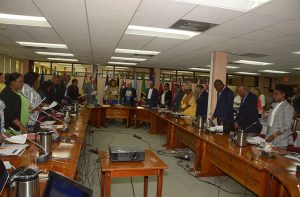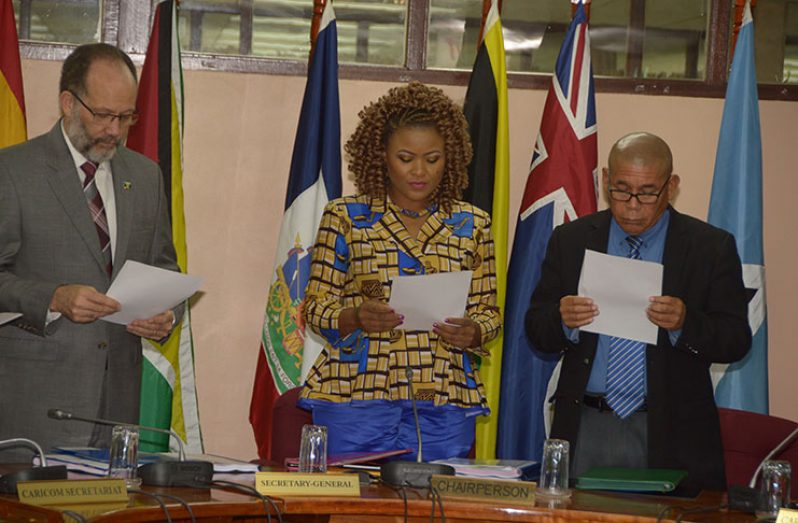-as CARICOM members gather for 36th COHSOD meet
MINISTERS of Culture from across CARICOM will be deliberating on the draft cultural strategy during the 36th meeting of The Council for Human and Social Development (COHSOD) at the CARICOM Secretariat, Liliendaal.
Secretary General of CARICOM, Irwin LaRocque said culture has an important role to play in contributing to the region’s sustainable development. Culture should be seen as the fourth pillar of sustainable development; as an enabler and driver of economic and social development and environmental sustainability. “CAIRCOM in keeping with the commitment to promote culture, established a taskforce which created a draft regional development strategy and action plan for the cultural industries of CARICOM,” said LaRocque during the opening day of the two-day meeting on Thursday.

The strategy which is titled “culture is our business” will be deliberated on over the next two days. According to LaRocque, the strategy sets out sector-specific strategies for the areas which the CARICOM region demonstrated comparative advantage.
The strategy includes music, audio visuals, visual arts, publishing, festivals, fashion, performing arts and craft. It also details strategic approaches to cross cutting elements such as policy, legislation, investment and financing, intellectual property management and human resource development. “Developing cultural and creative industries and growing the creative economy are the strategies being employed by Governments in the quest for inclusive economic development,” said LaRocque.
He said the region needs to find new development pathways which will encourage creativity and innovation. The Cultural Times Report completed by the United Nations Educational, Scientific and Cultural Organisation (UNESCO) reported that the global creative economy employed nearly 29.5 million people and generated more than US$2 trillion in revenue.
According to LaRocque, the creative sector employs more persons age 15-29 years than any other sector. Minister of Social Cohesion, Dr. George Norton said culture indeed has notable benefits which spread throughout the region and the world.
“We must see culture as a heritage, it is tapestry that binds and allows us to identify with each other, it inculcates the love of diverse art forms, it preserves and transmits our common history and customs… it contributes to the aesthetics of our environment and remains at the core of our continued quest for sustained unity,” said Dr. Norton.
He believes that CARICOM must guard against the domination of cultural penetration from elsewhere and actively seek to preserve, promote and guide the direction of cultural heritage in every sphere.
The role of culture to cohesion of the CARICOM community must never be underestimated, particularly in the face of globalisation.
In the past, culture was not included as an agenda item for certain discussions but, it is time the region seeks to mainstream culture in national development. “I can say Guyana we view culture as a central pillar to the sustained development of the region…with respect to preservation, even as we place a premium on the maintenance and preservation of our cultural heritage, we need to recognise that culture is versatile,” said Dr. Norton, adding that it is not static and the communal culture has been shaped by the meaningful inclusion of a variety of forces.
He believes that it is up to the policy makers to foster an environment which lends support to the artistic community through development-friendly policies which addresses capacity building, technical assistance and assistance to source funding which will transcend to economic value.
Trinidad and Tobago’s Minister of Community Development, Culture and the Arts, Dr. Nyan Gadsby-Dolly also shares the belief that culture must be developed and preserved.
“
It is time the nations of the region understand and utilise culture for self-elevation…examining our state of cultural consciousness and whether it can meaningfully contribute to economic prosperity across the region,” said Dr. Gadsby-Dolly. In order to create the self-sustaining cultural economic sector, she believes that there needs to be a paradigm shift and the region must place itself in the driver’s seat, charting together the course for cultural development based on already identified and potential cultural assets.
COHSOD is expected to explore and advise on creative ways of financing culture and the cultural industries at national and regional levels, by putting in place administrative legislation and financial support mechanisms for strengthening the cultural sector.




.jpg)









